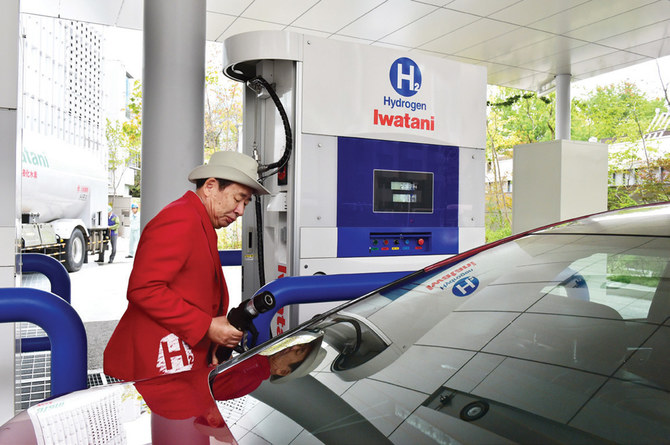DUBAI: Arabs generally underestimate how much of Japan’s oil imports come from Gulf Cooperation Council (GCC) member states, according to a YouGov survey.
Out of 3,033 respondents from the Arab world, 53 percent believe Japan imports 40 percent of its oil from the GCC, compared with just three in 10 who rightly believe it amounts to 85 percent.
Experts say this reflects a general lack of knowledge about the role of oil and gas in economic life.
“Most media reports in and around the Middle East and North Africa (MENA) with regard to security of energy supply … mention only two main customers: China and India,” said Cyril Widdershoven, director at Verocy, a Dutch consultancy advising on investments, energy and infrastructure risks and opportunities in the region. Japan is largely forgotten because it is a very mature market for Arab producers, he added.
Links to Japan go back to the 1950s, and the country’s growth in demand for oil- and gas-related products is largely flat.
“There isn’t a real growth momentum in energy or petroleum products,” Widdershoven said. “The only time Japan’s energy thirst hits the news is when something goes wrong with its nuclear plants, so demand for other energy sources jumps.”
To change Arabs’ perception of Japan’s energy relationship with the GCC, Widdershoven said there is a need for more in-depth media coverage of long-term strategic and economic links.
Mustapha Boussaid, managing partner at Arkad Advisors in the UAE, said traditionally only active energy market participants in the Arab world know the size of the oil trade conducted with Japan annually, partially due to its quiet diplomacy and low profile in the global trade arena.
“Most casual news readers think of the US as the biggest energy user and potentially the Arab world’s biggest customer, drawing on the 1970s historical events and that era’s embargo,” he told Arab News.
“In 2018, Japan imported 83 percent of its crude oil from the GCC, equivalent to approximately 925 million barrels,” he said.
“This is representative of the supply relationship dating back to the 1970s, and reflects both Japan’s dependence on the stable flow of the region’s oil trade, and the country’s importance as a strategic trade buyer.”
Dr. Theodore Karasik, senior advisor at Gulf State Analytics, said there is an assumption made about where oil exports go in the Far East.
“Perhaps because China looms large, there’s an altered interpretation of how big Japan is in terms of the energy picture,” he told Arab News.
“There needs to be a better understanding of how energy imports and consumption occur, and of differences between Japan and other East Asian nations.”
Japan’s imports from the Gulf grew significantly during the country’s modernization period, from 1945 to 1952, then through the “economic miracle” from 1952 to 1973, only to be reversed by the 1973-1975 oil shocks.
Then followed a period of diversification and coping with various regional crises until 1989. From that year onward, Japan began to face an economic slowdown.
“Throughout these time periods, because of oil, Japan at times treated energy relations carefully by balancing between key Gulf players and the US,” Karasik said.
“There are other factors involved in Japan’s approach that help it manage its reliance on Saudi and UAE energy sources, such as a deep understanding among the three countries of energy and its future.”
The Organization of the Petroleum Exporting Countries (OPEC) forecasts that Japan will continue to fulfil most of its needs from the GCC at least through 2030.
Saudi Arabia exported roughly $27.6 billion worth of oil to Japan in 2018 — roughly 12 percent of its total crude export volume — retaining its position as Japan’s largest supplier by contributing almost 50 percent of the country’s needs annually.
“During the last year, the UAE shipped $18.3 billion worth of crude oil to Japan, further highlighting their trade ties,” Boussaid said.
“This is the pivot on which the GCC-Japan relationship is built over the last several decades, encouraging all sides to quietly cement confidence in the GCC as reliable suppliers and, in return, securing Japan as a long-term client far from any unnecessary geopolitical tensions.”
Karasik predicts that relationships will be driven by natural gas and other forms of energy in the post-oil era.
“The natural pull of the international economic order toward China in the coming years, while energy consumption shifts to alternative, cleaner forms of energy, is already leading to close cooperation in renewable energy,” he said. Widdershoven said the future remains unclear as it will depend on Japan’s domestic energy transition to wind, solar and other sources.
“At the same time, Japan’s Asian dominance is over. China and potentially India will be much larger energy and petroleum product clients for GCC countries in the coming decades,” he added.
“The GCC also has to cope with the fact that other energy producers, such as Australia, are targeting the country (Japan).”
























